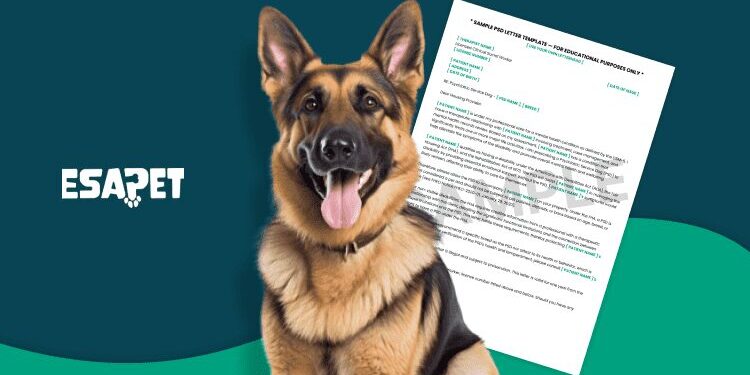Service Dog Registration Lookup: How to Verify a Service Dog (2026 Guide)

Service dogs are specially trained to perform tasks to help individuals with disabilities. Many people wonder whether service dog lookup services and registration numbers are legitimate. Some believe these tools provide an official way to verify a service dog.
However, no official federal or Americans with Disabilities Act (ADA)-mandated registry for service dog verification exists. The ADA does not require a registration number, certificate, or ID card for your service dog.
Unofficial services have no legal significance and may confuse dog handlers and businesses. Fake services may even register untrained pets as service dogs for a fee. This can lead to serious legal consequences, as the only officially recognized documents are Service Dog Letters.
What is a Service Dog?
The ADA defines service dogs as animals specially trained to perform tasks for people with disabilities. The tasks should be directly related to a person’s disability. Service dogs can interrupt harmful behaviors in people with PTSD, depression, and anxiety disorders.
They can guide a blind handler, alert a deaf person to sounds, and more. Service dogs differ from ESAs in that they undergo special training, while ESAs don’t. ESAs, through their presence, provide emotional support and comfort.
The ADA considers service animals and psychiatric service dogs to be working animals and grants them public access rights. ESAs don’t have these rights under the ADA.
The Truth About Service Dog Registration Numbers
No national service dog registration database exists, and the Americans with Disabilities Act does not need registration numbers. Private tools for lookup are optional and offer convenience but have no legal authority.
Here’s what you need to know about service animal verification and registration numbers:
- There is no government-recognized organization or database for service dog registration. Under the ADA, you don’t need to register.
- Private service animal registration lookup may help avoid conflicts and unnecessary questions when practicing public access rights. However, they have no legal value under the ADA. Be careful of scams and fraudulent activities.
- Though not required by the ADA, a Service Dog Letter is more trustworthy. It can help exercise service animals’ rights and avoid misunderstandings. A legitimate service dog letter comes from a licensed mental health professional (LMHP) or a legitimate provider that connects you to the LMHP, such as ESA Pet.
- Under the ADA, a service dog’s legitimacy is based on its training to perform specific tasks related to the person’s disability.
How to Verify a Service Dog’s Legitimacy
The ADA protects individuals with disabilities who use service dogs. It prohibits businesses and landlords from requiring documents to verify a service dog. Here are key steps to confirm whether a dog is a legitimate service dog:
- Ask the ADA-Approved Questions: Is the dog required because of a disability, and what task the dog performs?
- Evaluate the Dog’s Tasks: Observe whether the dog performs specific tasks to assist its handler. Genuine service dogs do not need constant prompting or correction.
- Observe Behavior: A trained service dog stays calm and focused, even in busy or crowded places. It should not get distracted by food, people, or other animals.
- Assess Leash Control: A real service dog follows basic commands and remains under control when on a leash.
- Avoid Requesting Documentation: Do not ask for a service dog proof or ID; the ADA does not need documentation. Exceptions apply in specific cases, like airlines. They can request the U.S. Department of Transportation Service Animal Form for verification.
Tools for Service Dog Registration Lookup
Some private companies offer tools to look up service dog registrations. These tools allow handlers to register their service dogs in a private database.
While these tools may be convenient, it’s important to note that registering a service dog is not legally required. Here are some pointers to keep in mind for the lookup tools:

Not Legally Required
The ADA does not recognize service dog registration lookup tools. They do not replace the need to ask the two ADA-approved questions.

Convenient for Housing or Travel
These tools can be helpful for certain situations, like housing or travel requests. The extra proof of a service dog might simplify the process.

Risk of Misuse
People misuse these tools to register untrained pets, leading to legal issues. This undermines the credibility of legitimate service dogs.
Legal Protections for Service Dogs
The ADA protects people with disabilities from discrimination in public settings. According to the ADA, service dogs can go with their handlers to all public places, including restaurants, cafes, public transportation, and more.
Service animals have special rights under the Fair Housing Act (FHA) and Air Carrier Access Act (ACAA). Landlords must allow them, even in no-pet housing under the FHA. They can’t charge extra fees or set limits on breed, size, or weight.
Airlines must let service dogs fly in the cabin for free under the ACAA. State and local governments can enforce health and safety regulations for service animals. They may need vaccinations and licensing.
Responsibilities of Service Dog Handlers
The ADA gives service dogs public access rights. However, handlers must ensure their dog behaves and meets legal requirements. Here are the key responsibilities of service animal owners:
Keep the dog under control with a leash, harness, or tether.
Ensure the dog is housebroken, clean, and odor-free.
Remove the dog if it shows aggression or disruptive behavior, such as excessive barking.
Train the dog to remain calm and avoid distractions in public spaces.
Comply with local vaccination and licensing requirements.
When Businesses Can Ask a Service Dog to Leave
The ADA allows businesses to legally ask a handler to remove their dog under certain circumstances. Here’s when you can ask to remove a service dog:
- A service dog poses a direct threat to the health or safety of others.
- The dog shows disruptive or unsafe behavior or has a history of such behavior.
- The dog is not under the control of the owner. For example, when the dog barks uncontrollably in a restaurant or knocks over displays in a store.
Spotting Fake Service Dog Documentation
Some signs that help you catch fake service dogs are fake service dog documentation, vests, ID cards, and fake service dog prescription letters. These items are misused to gain public access for untrained pets. Fake vests may have flashy or overly decorative designs that are not typical of genuine service dog equipment.
Remember that the ADA does not need service dogs to wear vests, carry ID cards, or be registered. Businesses or landlords can verify legitimacy by only asking ADA-compliant questions.
Risks of Misrepresentation and Legal Penalties
Some people may misrepresent a pet or ESA as a service animal to gain public access rights. This is both legally and ethically wrong. Here are the risks of service dog misrepresentation:
- State fines for misrepresenting a service dog range from $100 to $1,000, depending on the state.
- Repeat offenders may face jail time, such as six months in California.
- Misrepresentation undermines the rights of legitimate service dog handlers.
- False claims can result in eviction or denial of access to public spaces.
Famous Legal Cases Involving Service Dogs
Legal cases involving service dogs reveal the complexities of balancing rights and responsibilities. From schools denying service dogs to concerns over safety in medical settings, these disputes highlight the importance of adherence to ADA guidelines.
Here are some famous legal cases involving service dogs:
- In 2017, the US Supreme Court ruled in favor of a student in the Fry v. Napoleon Community Schools (2017) case, which involved the denial of a service dog in a school.
- In the Bennett v. Hurley Medical Center case, a federal judge ruled against the intern’s lawsuit. The judge found that the hospital reasonably concluded that the intern’s service dog was a direct threat to the health and safety of others.
ESA Pet’s Process for Service Dog Documentation
ESA Pet is a reliable online service that provides legitimate ESA and service dog/PSD letters. It has LMHPs on its team to follow FHA and state-specific guidelines. ESA Pet has a simple 3-step process for obtaining a service dog/PSD letter:
- Complete our brief pre-qualifying quiz. It includes a questionnaire about your disability and your dog’s behavior and training. This helps determine if you qualify for a PSD Letter.
- ESA Pet will connect you with a licensed mental health professional (LMHP). The LMHP will thoroughly assess your disability to determine if a PSD is right for you.
- If approved, a PSD letter will be issued by the LMHP on their letterhead. You will receive your letter within 24-48 hours.
Get a Legitimate Service Dog Letter
To get a legitimate service dog letter, use ESA Pet’s screening tool. This tool helps determine your eligibility for a service dog letter based on your needs.
Get your Official PSD Letter Consultation from a licensed therapist.
Get PSD Letter Now
Service Dog Verification for Landlords and Businesses
Landlords and businesses must follow the ADA to avoid discrimination against individuals with service dogs. The ADA provides specific guidelines for verifying service dogs without overstepping legal boundaries. Here are the steps to ensure compliance:
- Politely ask if the dog is required due to a disability and what tasks it is trained to perform. Avoid inquiring about the nature of the disability.
- Ensure the dog behaves appropriately in public and performs the described tasks. Disruptive, aggressive, or untrained dogs do not meet ADA standards.
- The ADA does not need service dogs to have registration, certification, or special IDs. Avoid asking for these documents.
- If there are doubts about the dog’s legitimacy, request a letter from an LMHP confirming the individual’s need for a service dog.
Emotional Support Animals vs. Service Dogs
ESAs provide emotional support and companionship to people with mental health issues. They don’t need special training. ESAs only have housing rights under the Fair Housing Act (FHA).
Service animals are specially trained to perform tasks to assist individuals with disabilities. Under the Americans with Disabilities Act (ADA), Air Carrier Access Act (ACAA), and Fair Housing Act (FHA), service dogs have public access, travel, and housing rights.
Emotional Support Animals vs. Service Dogs
ESAs and service dogs both provide assistance. However, their roles and legal protections differ significantly. Service dogs perform specific tasks for individuals with disabilities and are granted public access rights under the ADA.
ESAs provide comfort without specific training. They are not allowed in public places but are covered under the FHA for housing accommodations.
Tasks
- Guiding a blind person
- Alerting a deaf person to sounds and alarms
- Opening and closing doors for people with mobility impairment
ESAs provide comfort through their presence and companionship
| Feature | Service Dogs | ESAs |
|---|---|---|
| Legal Protections in Public | Under the ADA, dogs can accompany their handlers to all public places. | ESAs are not legally allowed in public places under the ADA. |
| Training | Service dogs are trained to perform specific tasks related to their handlers’ disabilities. | ESAs don’t undergo any specialized training. |
| Tasks |
| ESAs provide comfort through their presence and companionship |
| Air travel rights | Covered under the ACAA. | ESAs are no longer covered under ACAA. Airlines treat them as pets. |
| Housing rights | Covered under the FHA | Protected under the FHA |
Check All Differences Between ESAs and Service Animals
FAQs About Service Dog Verification
Can I Look Up a Service Dog’s Registration Number?
If a service dog is registered with a registration lookup service, you can search for it in their database. You can use the registration number provided by the service to look up the service dog’s details.
Do Service Dogs Need an ID Card?
No. Service dogs don’t legally require an ID card under the ADA or any other law. Some owners get their dogs’ ID cards and registration numbers for their convenience. However, it is crucial to be aware of fake ID cards.
What Questions Can Businesses Ask About a Service Dog?
The ADA only allows a business to ask two questions about a service dog. These include whether the dog is required for a disability and what task it has been trained to perform.
Are Landlords Allowed to Request Documentation for Service Dogs?
No. Under the FHA, landlords are generally not allowed to require documentation for a service dog. However, when the disability or the need for the animal is not obvious, landlords can only request a Service Dog Letter.
Can Service Dogs Be of Any Breed or Size?
Yes. Service dogs can be of any breed or size, provided they are trained to perform specific tasks. The ADA does not impose any restrictions on service dog breeds or sizes.
Conclusion
Verifying service animals while ensuring compliance with ADA guidelines and respecting the rights of individuals with disabilities is crucial. It’s essential to focus on the dog’s behavior and tasks rather than documentation.
ESA Pet plays a key role in offering legitimate service animal documentation. It provides valid ESA and service dog letters issued by LMHPs.

Service Animals, Psychiatric Service Dog
10 Home Remedies for Arthritis: Reduce J...
Jonalyn Dionio
Jan 15 2026

Service Dog Types and Breeds, Psychiatric Service Dog, Service Animals
Types of Service Animals: Which One is B...
Brenda Mejia
Dec 12 2025










